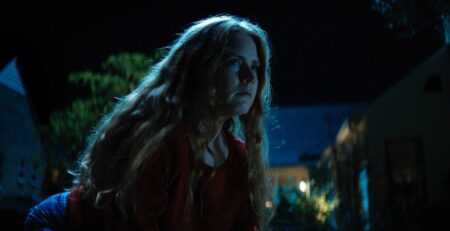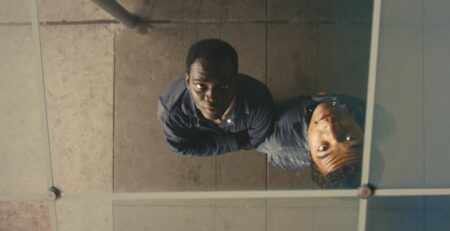Directed by E.oni and based on the bestselling novel by Park Sang-young, Love In The Big City swings big and connects for the most part. There’s no shortage of emotions in this Korean drama that somehow, miraculously, toes the line of broad humor with genuine human connection. While the filmmaking leans heavily into any emotional moment it stumbles across (of which there are many), the core relationship is so well established with such formidable chemistry between the two leads that, regardless of how ludicrous the scenario, the film lands its punches.
Spanning the course of more than a decade, Love In The Big City centers on two relative outcasts. There’s Jae-hee (Kim Go-eun), whose forward attitude and abundance of confidence make her an easy target—especially as a woman who goes against the uniform conformity of South Korean culture. Her individuality sparks gossip as romantic suitors and critics hound her alike (and it’s when the two combine that things get ugly).
She finds a kindred spirit in Heung-soo (Steve Sanghyun Noh), whose sexuality makes him feel like a misfit. These two aimless souls find a unique tether in their friendship, exploring their identities, romance, and what it means to be a single person living in Seoul who doesn’t fit within the standardized margins.
Throughout the film, the story steamrolls through countless plot developments. This can be to its detriment, especially with its wildly contrasting tones. In no particular order, Jae-hee and Heung-soo face slut-shaming, homophobia, sexual and physical assault, and more. And yet, the film will still pivot to a more standard, overly lit K-Drama sequence that goes for over-annunciated arguments and hard slaps on the back and split-screen montages. These dissonant tones threaten whiplash, but the two lead characters and the lived camaraderie between them make us willing to look past those shortcomings.
It doesn’t hurt that some of the humor works really well. There are sight gags, such as a defeated Jae-hee curled up in the corner after a night of debauchery and drunken tattoos. But there’s also the familiarity of the pair arguing about the most asinine topics—of shared razors and taking the trash out—that elicit some of the biggest laughs. They’re human moments in a film that often relies on a synthetically glossy effect.
However, the film gains its biggest momentum when it bridges the drama with these human moments—specifically when the two are there for one another. Early in their relationship, Heung-soo and Jae-hee decide to live together. He’ll pretend to be a protective roommate when men get too pushy, and she’ll be his sister to help him avoid unwanted social engagements. But what begins as cohabitation turns into a genuine bond. They are the others ‘person,’ and the fact that it remains wholly platonic only makes it land with greater significance.
The tonal messiness of Love In The Big City diminishes in these shared moments. They find ways to balance humor with the heart and gravity of the moment. A petty argument deescalates with urgency once they discover that the other is suffering in some way, their love and concern trumping their fleeting annoyance. Jae-hee goes to bat for Heung-soo, believing in his capacity for love and the necessity that he chases it. Meanwhile, Heung-soo is often the only person standing in Jae-hee’s corner as jealous boyfriends and literal stalkers torment her. They are their biggest instigators and greatest sources of comfort, something that E.oni, along with the leads, capture.
And credit where credit is due, the film refuses to shy away from Korean women’s hardships. Society constantly condemns Jae-hee for choosing her individuality, and the film validates the character’s fears and concerns. The film similarly honors Heung-soo’s journey in accepting his sexuality. It doesn’t happen overnight, and the way it shows the characters benefit from the influence of popular culture and media is relatable. In a film that clashes with subtlety, it’s a gentle reminder of the significance of queer representation in media and the integrity of seeking oneself on screen. Love In The Big City might not be as radical as it could be, but it doesn’t pull any punches.
The film wouldn’t be quite as effective without Kim Go-eun and Steve Sanghyun Noh. Both deliver winsome and charismatic performances, their comfort within one another’s spaces establishing their characters’ friendship. From the slapstick to the heartbreaking, they’re committed 100% throughout. The two can convey as much through roughhousing as when their characters confess their innermost demons and desires. The clunkiest writing can’t diminish the way they electrify the screen.
Early in the film, Jae-hee asks, “How can being yourself be a weakness,” and that sincerity pulsates throughout. Love In The Big City might be allergic to subtlety, but it doesn’t suffer because of it. Instead, the film succeeds due to a charming leading duo and an energized script that engages viewers from start to end. And, perhaps most notably, it excels because it understands a fundamental truth. As wonderful and life-altering as romantic relationships are, platonic love is just as transcendent. It can provide just as sweeping a romance in all its warmth and chosen family antics.
Love in the Big City played as part of the 2024 Toronto International Film Festival.
Love in the Big City
-
Rating - 7/107/10
TL;DR
Love In The Big City might be allergic to subtlety, but it doesn’t suffer because of it. Instead, the film succeeds due to a charming leading duo and an energized script that engages viewers from start to end.





